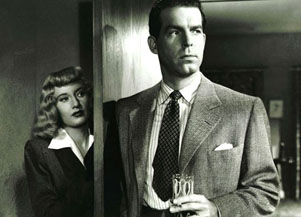|
|
A-List:
|

|
So why doesn't Joe leave? He hates it so much, right? Well...maybe he doesn't. Though, as it was referenced in American Beauty's opening scene, Joe ends up facedown in a swimming pool, he has some unspeakable, unknown interest in Norma. Maybe it's living in some form of luxury, maybe it's the fact that he doesn't have to do anything when Norma is providing for him, but Joe is unable to extricate himself from this wholly one-of-a-kind situation. He could get out, meet a new girl, move in somewhere else, but Joe is too weak to do anything but snipe and snark all day long. We're meant to be sympathetic, or something close to it, when we first realize that Joe's not long for this world. But, though he is self-aware and self-deprecating, Joe Gillis is just another in the line of film noir's weak, weak protagonists, too lazy and selfish to do anything smart. New at BOP: Share & Save
![]() Tweet
Tweet
![]() Print this column
Print this column
Fred MacMurray in Double Indemnity
Billy Wilder, the same man who directed Sunset Boulevard in 1950, first broke into Hollywood stardom with his 1944 film noir Double Indemnity. Though he's best-known for his more crowd-pleasing films, such as The Fortune Cookie or even the darker The Apartment, Wilder's noir films are among the greatest. As the would-be shrewd and wise Walter Neff, Fred MacMurray is at his lowest, his slimiest and his worst. Neff falls hopelessly in love with Phyllis Dietrichson (Barbara Stanwyck), a femme fatale to end all femme fatales. She wants to murder her husband, take all of the money, and ends up getting Neff involved. Suffice to say, seeing that this is a film noir, the plan doesn't exactly go as it should, with Neff ending up telling his story to his boss via tape recorder as he lays dying.
Yes, Sunset Boulevard and Double Indemnity share one vital connection, with the framing device of the dying or dead narrator telling us how he got to that point. However, the main difference is that Neff, while being weak and spineless, doesn't really hate Phyllis. The screenplay, by Wilder and Raymond Chandler, is filled with double entendres and heated flirtations between Neff and Dietrichson. There's no vitriolic hate here, or not nearly as much of it. Of course, the strongest relationship here is between Neff and his boss, Barton Keyes, as played by Edward G. Robinson, who plays a good guy here, trying to be understanding even though his employee is a criminal. Theirs is the one that is most touching, even though Neff remains weak to the very end, self-involved as he draws his last breath.
|
Advertisement |
Tom Neal in Detour
I know, I know. You're probably scratching your head right now, racking your brain as you try to figure out exactly what movie I'm talking about. I would not blame you if you weren't too familiar with Detour, a 1945 film noir directed by Edgar Ulmer. This movie, made on the poverty row of Hollywood, is one of the cheaper, well-known film noirs. Tom Neal, the lead, plays Al Roberts, a mopey, down-on-his-luck musician who wants to head to California to live with his girl. Along the way, he meets a chatty, friendly shyster who drives him part of the way. Too bad the shyster ends up dead, and Al has to clean up the mess. When Vera, a fellow hitchhiker, realizes that Al is driving a dead man's car, she decides to recruit him in blackmailing the dead man's family.
More than in any other movie here, Al is about as whiny and weak as they get. This is a noir of a man's own making. Al appears to be scott free early on, but once Vera comes into his life, he's unable, unwilling to do anything, until it's too late and he's easily caught. Neal is borderline obnoxious here, as someone who's just too easily convinced that he's stuck in the situation he's been forced into. At so many junctures, Al could get out of his problems, but he just won't leave. In general, Detour is a fascinating film noir, filmed quickly, incredibly short, yet incredibly evocative and indelible. Neal may not be the greatest actor, but for the role of Al Roberts, he is perfect in his wimpiness.

|
|
|

|
Friday, November 1, 2024
© 2024 Box Office Prophets, a division of One Of Us, Inc.

